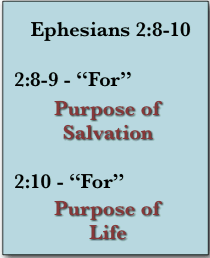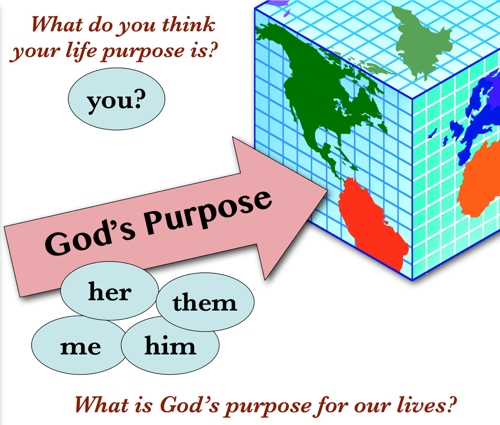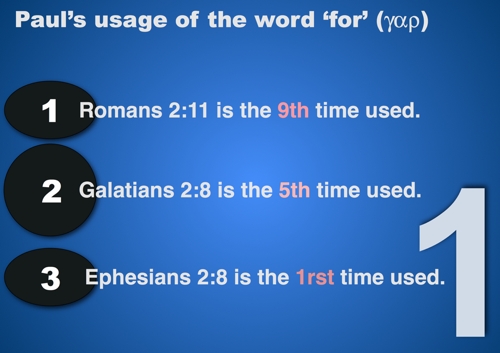
 |
|
Extraordinary Purpose is The Bible Teaching Commentary based on Ephesians 2:8-9. Ephesians 2:8, 9, 10 explains why the apostle have only now started using a favorite word here in this passage rather than earlier on. We will see that it is because Paul explains both why God has saved us as he has in Christ as well as what He has saved us for! |
Life Purpose (Ephesians 2:8-10) | Purpose of Salvation (Ephesians 2:8-9) | Purpose for Our Lives (Ephesians 2:10) | Questions (Ephesians 2:8-10)
|
Introduction to 'Extraordinary Purpose'
Ephesians 2:8-10
8 For by grace you have been saved through faith; and that not of yourselves, it is the gift of God; 9 not as a result of works, that no one should boast. 10 For we are His workmanship, created in Christ Jesus for good works, which God prepared beforehand, that we should walk in them (Ephesians 2:8-10).
Introduction
Many of us are so busy living that we forget what we are living for. When things are going well, the absence of purpose seems not to matter. We are distracted by the way our immediate impulses are being gratified. We sit down at a restaurant looking at a menu, watch a new movie or read a magazine. But when life gets difficult or impossible, it is then that we begin to see life different than we thought. It is then that the question of meaning of life comes into view:
“Why am I living?”
“What am I living for?”
| The English word ‘for’ is used in 1:15, 1:18, but it is not used in the Greek. Different prepositions are used in those cases. I am talking about the actual Greek word ‘gar’ used in the original Greek text of Ephesians. |
As we go through Ephesians 2:8-10, we will be able to get a strong idea of God’s will and how it relates to our lives.
I have found a fun Bible study exercise. Notice what words are being used and how they are being used in different writings. In this case, I am examining one of Paul’s favorite words, the little three-letter word ‘for.’
Paul often uses the word ‘for.’ He loves to explain things. He delights in getting caught up in the purpose of how things work out. In Ephesians Paul uses the word ‘for’ 11 times. Ephesians 2:8 is the first time the Greek word (gar), the word ‘for,’ is used in this book. It is rather peculiar that he has not used this word earlier on. We add a little summary to get even a better appreciation of his use of ‘for’ here.
Paul used the little word ‘for’ 9 times from the beginning of Romans up to Romans 2:11.
The word ‘for’ is used in Galatians 2:8 the fifth time.
Ephesians 2:8 is the first time the word ‘for’ is used in the book.
We can learn two things from the way Paul used the word ‘for’ here compared to other places. Firstly, it speaks of how preoccupied Paul was up to this point. He did not, as it is, even have time to catch up to the many descriptive statements that he earlier had made. He was stunned just observing God’s amazing grace. Paul had been exalting God. He was at the same time trying to catch us up in the same chorus of praise by almost endlessly pointing out God’s great mercy toward us who believe in Christ. In verse 8, however, things change. He is at once trying to pull all his thoughts together and see what they practically mean. This then leads us into the second reason for Paul’s use of ‘for’ here.
 Most of BFF articles such as this one is nicely formatted for printing. This article also has a Powerpoint. Check out the huge BFF NT Biblical Digital Library all at one low cost, not just for Ephesians but the whole New Testament! |
Second, he calls us to understand God’s overall purpose in saving people like us. The word ‘for’ explains the reason for something. Paul is thinking about God’s grand salvation. We must understand why God has done these things. God’s grace is so uncommon and extraordinary, there must be a reason for it. The most basic question is not what we think our purpose for life is but, “What is God’s great purpose for His great plan of salvation?” If we are not careful, we could miss the main purpose for the universe. We might never learn the reason for our existence. Why did God treat us so kindly?
We should have a reaction somewhat like Ruth’s when Boaz kept treating her so kindly? Something seemed out of kilter. It was only later that Ruth discovered that Boaz was a relative.
We all have a purpose in life. Sometimes they are very lowly. Much like animals, we just want to care for our bodily needs. Our eyes can’t get above our appetites. We might not have thought of these matters, but we all have a purpose in life which ultimately shapes our view of life.
A Mind Change
Paul is trying to reshape our world view through what he writes. He wants to make Christ’s glory all significant in every thought and decision in our lives. He is to receive all glory and so we focus on serving Him and bringing Him glory. What is God’s purpose for your lives? What does he have for you to do in your short span of time on earth? Without ascertaining that purpose, you might indeed miss out the great reasons God has made you. Paul in Ephesians 2:1 said that we were dead in our sins. This word ‘sin’ is a description how we missed the mark. Are you going to miss the mark of what God has for you?
Did you ever get to a place without knowing where you are going? Probably not, that is, unless some one else is driving. And that is a risky chance to take given the lives of those around us. I remember once getting into India well after midnight. I had arranged to be picked up at the airport by some local hotel. But I ended up going down this dark and small lane. I did start wondering where I was being taken. I started on some serious prayer but, fortunately, everything ended up okay.
Discipleship is all about getting some place where we ought to be in our lives. It requires certain disciplines and practices. We are disciples of Jesus because we want to obey what He tells us. What He thinks about life and events have such a great importance in our lives that we actually conform our decisions to His. We will explain the general purposes God has for your life. You will need to fill in the details, but this framework here is critical to understand how to know what God wants for your lives.
 Today, we will focus on the two ‘for’ statements Paul uses in these three verses. They are the first two ‘for’s listed in this book. Ephesians 2:8-9 and 2:10 speak of two different purposes that God has dealt with us. Now remember, this is not for every person and venture to say it is not true of every person here that will hear this message. These are true for those who have come to grips with their sins, repented and come to life in Christ just as the Ephesian Christian had many a generation ago,
Today, we will focus on the two ‘for’ statements Paul uses in these three verses. They are the first two ‘for’s listed in this book. Ephesians 2:8-9 and 2:10 speak of two different purposes that God has dealt with us. Now remember, this is not for every person and venture to say it is not true of every person here that will hear this message. These are true for those who have come to grips with their sins, repented and come to life in Christ just as the Ephesian Christian had many a generation ago,
In Him, you also, after listening to the message of truth, the gospel of your salvation--having also believed, you were sealed in Him with the Holy Spirit of promise (Ephesians 1:13).
But you can listen. You might be wondering why I should be a Christian. Most people answer this question by what a Christian does. A follower of Jesus does this or does not do that. Some churches bungle their answer by saying a follower of Jesus is noted by not going to parties or not wearing that certain kind style of clothes. There is confusion as to what Christianity as a culture is as compared to Christ living in His people. This is unfortunate. In any case, we will give you a better answer. What we do as Jesus’ disciples is important, but it is only a 30% satisfactory kind of answer. More important is why we do certain things.
Paul knew what he was living for. He knew why God made him. The clarity with which he understood God’s will made him all the more effective in accomplishing those tasks. That is good enough for him but if we ever are going to join him in this song of exaltation, we need to get much deeper. We need so to speak, not just get our toes wet by the water, but plunge in head and all.
Enough said on these things. Let us look at the two purposes Paul mentions here. He will speak more clearly about our purpose in the following verses, but what he says here is quite sufficient to engage our minds at this point.
Next =>
B. Purpose #2: Shows the purpose God has for our lives in Christ (Ephesians 2:10)
info@foundationsforfreedom.net
Scriptures typically quoted from the New American Standard Bible unless noted:
(C) Copyright The Lockman Foundation 1988











